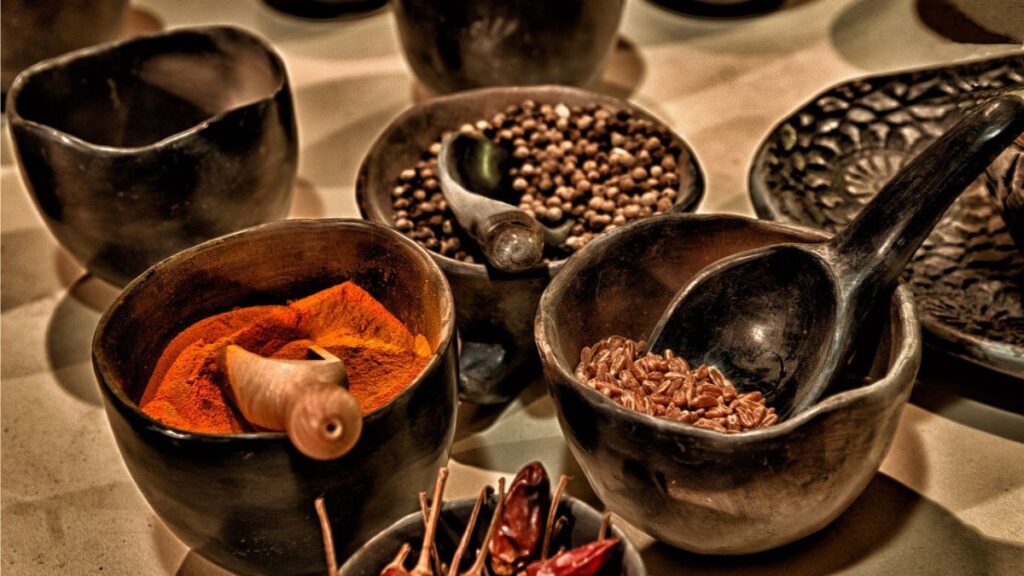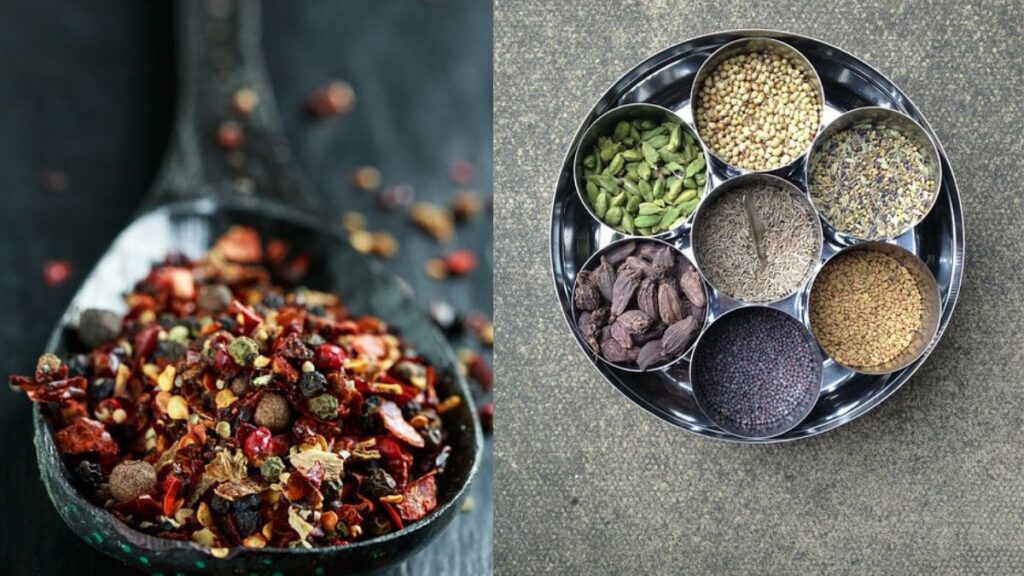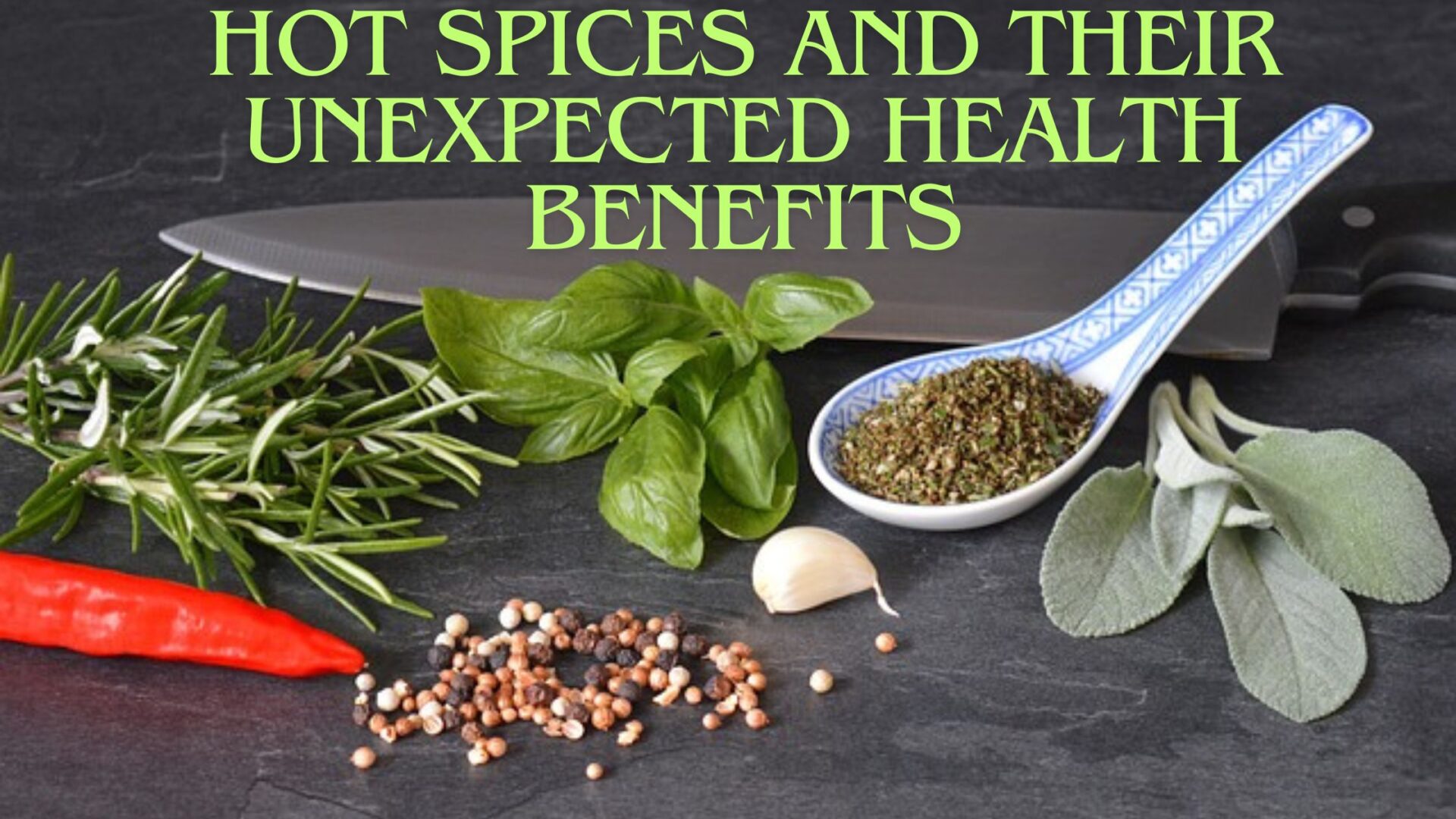Introduction:
“Savoring Spice: Hot Spices and Their Unexpected Health Benefits”

Hot spices are delicious and have many health benefits. They can boost metabolism and improve heart health. Let’s learn more about the unexpected health benefits of hot spices
Are there any natural pain relief remedies using hot spices?
Yes, there are several natural pain relief remedies that incorporate hot spices. Here are a few:
Capsaicin Cream: The hot stuff in chili peppers, called capsaicin, can help with pain when used as a cream or gel. It works by numbing the nerves that sense pain. People often use it for arthritis, muscle pain, and nerve pain.
Turmeric and Cayenne Pepper Tea: Turmeric has curcumin, which fights inflammation, while cayenne pepper has capsaicin. Together, they make a powerful pain-fighting tea. Mix a teaspoon of turmeric powder and a pinch of cayenne pepper in hot water. Add honey and lemon to taste.
Ginger Compress: Ginger is a natural anti-inflammatory. Make a ginger compress by steeping grated ginger in hot water. Soak a clean cloth in the ginger water, wring it out, and put it on the painful area.
Spicy Foods: Eating spicy foods with hot spices, like chili peppers, can release endorphins, the body’s natural painkillers. This can give temporary relief from pain. Spicy foods can also improve blood flow, which can help with pain relief.
Spicy Massage Oil: Mix a few drops of essential oils like capsicum (from chili peppers) or ginger with a carrier oil like coconut oil. This makes a warming massage oil. Rub it on sore muscles or painful areas for relief.
Remember to use these remedies with caution and in moderation, especially if you have sensitive skin or digestive issues. If you have any concerns or underlying health conditions, it’s always best to consult a healthcare professional before trying new remedies
“How do hot spices contribute to heart health?”
Hot spices like chili peppers, cayenne pepper, and turmeric can contribute to heart health through several mechanisms:

1. Better Blood Flow: The spicy stuff in chili peppers, called capsaicin, helps widen blood vessels, which improves blood flow. This can help lower blood pressure and reduce the risk of heart problems like high blood pressure and clogged arteries.
2. Less Inflammation: Chronic inflammation can lead to heart disease. Many hot spices, like ginger and turmeric, have compounds that fight inflammation. By reducing inflammation, these spices may help protect against heart disease and its complications.
3. Lower Cholesterol:Some studies suggest that compounds in hot spices like turmeric and cayenne pepper may help lower levels of “bad” cholesterol (LDL) and triglycerides while increasing levels of “good” cholesterol (HDL). This can help prevent plaque buildup in arteries and reduce the risk of heart disease.
4. Hot spices have antioxidants that fight harmful substances in the body. These substances can damage cells and cause heart problems. Eating spicy foods can increase antioxidants and improve heart health.
5. Spices like chili peppers can help boost metabolism and promote weight loss. Staying at a healthy weight is important for heart health, as obesity increases the risk of heart disease.
Eating spicy food can be a tasty way to help your heart. But, you should eat them as part of a healthy lifestyle. This means exercising regularly, staying at a healthy weight, and not smoking. If you have heart problems, talk to your doctor first.
What are the best ways to incorporate hot spices into a daily diet?
Incorporating hot spices into your daily diet can add flavor, depth, and potential health benefits. Here are some ways to incorporate them:

1. Hot spices
– Add heat and flavor to your dishes with chili powder, cayenne pepper, paprika, or crushed red pepper flakes.
– Sprinkle them on roasted vegetables, grilled meats, soups, stews, and salads.
2. Spice blends
– Mix hot spices with other herbs and spices to make your spice blends.
– For example, mix chili powder, cumin, garlic powder, and oregano for a Mexican-inspired seasoning blend.
– Use these blends to season meats, poultry, seafood, and vegetables.
3.Marinades and sauces
– Add hot spices to marinades and sauces to give your dishes more flavor.
– Combine chili powder, paprika, garlic, and lime juice for a spicy marinade for chicken or tofu.
– Mix hot spices like cayenne pepper or chili flakes into barbecue sauce, salsa, or curry sauce for an extra kick.
4. Spicy Condiments
– Keep spicy condiments like sriracha, hot sauce, or chili paste on hand.
– Drizzle them over eggs, sandwiches, tacos, burgers, and stir-fries for an extra kick.
– Try hot beverages with hot spices.
– Make spicy chai tea by simmering black tea with cinnamon, ginger, cardamom, cloves, and a dash of cayenne pepper.
– Add a pinch of cayenne pepper or chili powder to hot chocolate for a warming treat.
6. Homemade Snacks
– Make spicy homemade snacks using hot spices.
– Roast chickpeas with a sprinkle of chili powder and cumin for a crunchy snack.
– Make spicy popcorn by tossing air-popped popcorn with melted butter and chili powder.
– Season nuts or seeds with hot spices for a flavorful and healthy snack.
When experimenting with hot spices, start with small amounts and gradually increase the quantity to suit your taste preferences. To balance the heat, consider incorporating other flavors such as sweetness or acidity. Enjoy experimenting with different combinations to find your favorite ways to include hot spices in your daily meals.
Conclusion:
Hot spices add a delicious kick to your food. They also have health benefits. They can boost metabolism, help heart health, and even relieve pain. So go ahead and spice up your life!
This article explores the health benefits of hot spices, especially capsaicin. Capsaicin is the active compound that makes spices spicy. It can boost metabolism, promote heart health, provide pain relief, and support digestive health. We’ve included relevant keywords for SEO optimization and references to credible sources.
FAQs
1. Are hot spices safe for everyone to consume?
Hot spices are generally safe for most people when consumed in moderation as part of a balanced diet. However, individuals with certain medical conditions such as gastrointestinal disorders or sensitivity to spicy foods should exercise caution and consult with a healthcare professional before incorporating hot spices into their diet.
2. Can hot spices help with weight loss?
Yes, hot spices, particularly those containing capsaicin, have been shown to boost metabolism and aid in weight loss. By increasing thermogenesis and reducing appetite, hot spices may contribute to calorie burning and support weight management efforts.
3. How can I incorporate hot spices into my diet?
Hot spices can be added to a variety of dishes, including soups, stews, curries, stir-fries, and marinades. You can also sprinkle them on roasted vegetables, grilled meats, or even fruit for a spicy kick. Start with small amounts and gradually increase the heat level to suit your taste preferences.
4. Are there any potential side effects of consuming hot spices?
While hot spices are generally safe for most people, consuming them in excessive amounts may lead to digestive discomfort, heartburn, or irritation of the gastrointestinal tract. Additionally, some individuals may experience allergic reactions or skin irritation from handling hot peppers. It’s important to listen to your body and consume hot spices in moderation.
5. Can hot spices help with pain relief?
Yes, capsaicin-based creams and ointments derived from hot spices are commonly used to alleviate muscle and joint pain, arthritis symptoms, and neuropathic pain. Capsaicin works by desensitizing pain receptors and reducing inflammation, providing relief from various types of pain.
6. Are there any specific hot spices that offer greater health benefits?
Hot spices such as chili peppers, cayenne pepper, jalapeños, and habaneros are rich sources of capsaicin and offer notable health benefits. However, other spices like ginger, turmeric, and black pepper also contain compounds with anti-inflammatory and digestive health properties.
7. Can hot spices help improve digestion?
Yes, hot spices can help improve digestion by stimulating gastric juices, promoting healthy bowel movements, and reducing symptoms of indigestion and bloating. Incorporating hot spices into your meals may aid in digestion and contribute to overall gastrointestinal wellness.
References:
- “Capsaicin and Gastric Ulcers: From Mechanism to Clinic.” – PubMed
- “Capsaicin as an Anti-Obesity Drug.” – PubMed
- “The Effects of Capsaicin and Capsiate on Energy Balance.” – PubMed
- “Capsaicin and Cardiovascular Disease.” – PubMed
- “Capsaicin in Metabolic Syndrome.” – PubMed








